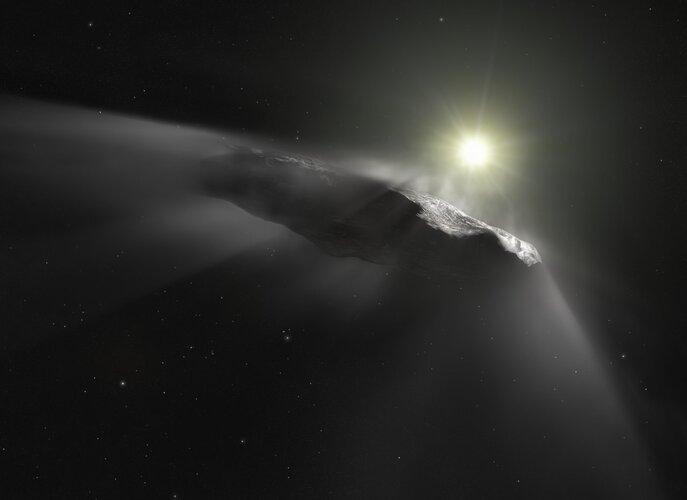
Copernical Team
Gilmour Space again delays launch of Australia's first orbital rocket
 The Australian aerospace firm Gilmour Space has again delayed the launch of its Eris 1 rocket, the country's first orbital rocket.
Gilmour Space said Wednesday that it was standing down from a planned launch of what would be the first test flight of the rocket.
"We've made the tough call to postpone this week's launch," the company said in a statement. It said the pause would giv
The Australian aerospace firm Gilmour Space has again delayed the launch of its Eris 1 rocket, the country's first orbital rocket.
Gilmour Space said Wednesday that it was standing down from a planned launch of what would be the first test flight of the rocket.
"We've made the tough call to postpone this week's launch," the company said in a statement. It said the pause would giv Michelin-star chef prepares ISS meals for French astronaut
 When French astronaut Sophie Adenot arrives at the International Space Station in 2026, she will dine on French gastronomical classics such as lobster bisque, foie gras and onion soup prepared especially for her by a chef with 10 Michelin stars.
Parsnip and haddock veloute, chicken with tonka beans and creamy polenta, and a chocolate cream with hazelnut cazette flower will also be on the men
When French astronaut Sophie Adenot arrives at the International Space Station in 2026, she will dine on French gastronomical classics such as lobster bisque, foie gras and onion soup prepared especially for her by a chef with 10 Michelin stars.
Parsnip and haddock veloute, chicken with tonka beans and creamy polenta, and a chocolate cream with hazelnut cazette flower will also be on the men Third-ever confirmed interstellar object blazing through Solar System
 Astronomers on Wednesday confirmed the discovery of an interstellar object racing through our Solar System - only the third ever spotted, though scientists suspect many more may slip past unnoticed.
The visitor from the stars, designated 3I/Atlas, is likely the largest yet detected, and has been classified as a comet, or cosmic snowball.
"It looks kind of fuzzy," Peter Veres, an astrono
Astronomers on Wednesday confirmed the discovery of an interstellar object racing through our Solar System - only the third ever spotted, though scientists suspect many more may slip past unnoticed.
The visitor from the stars, designated 3I/Atlas, is likely the largest yet detected, and has been classified as a comet, or cosmic snowball.
"It looks kind of fuzzy," Peter Veres, an astrono Why is there no life on Mars? Rover finds a clue
 Why is Mars barren and uninhabitable, while life has always thrived here on our relatively similar planet Earth?
A discovery made by a NASA rover has offered a clue for this mystery, new research said Wednesday, suggesting that while rivers once sporadically flowed on Mars, it was doomed to mostly be a desert planet.
Mars is thought to currently have all the necessary ingredients for li
Why is Mars barren and uninhabitable, while life has always thrived here on our relatively similar planet Earth?
A discovery made by a NASA rover has offered a clue for this mystery, new research said Wednesday, suggesting that while rivers once sporadically flowed on Mars, it was doomed to mostly be a desert planet.
Mars is thought to currently have all the necessary ingredients for li Week in images: 30 June - 4 July 2025

Week in images: 30 June - 4 July 2025
Discover our week through the lens
Earth from Space: Zanzibar, Tanzania
 Image:
Earth from Space: Zanzibar, Tanzania
Image:
Earth from Space: Zanzibar, Tanzania Antarctic waters getting saltier as sea ice wanes

Using data from ESA’s SMOS satellite, scientists have revealed a surprising shift in the Southern Ocean – surface waters around Antarctica are growing saltier, even as sea ice is diminishing rapidly. This finding defies the norm because melting ice typically freshens ocean surface water.
The implications are far-reaching as changes in this remote region can disrupt global ocean currents, affect climate patterns, and alter ecosystems far beyond the Antarctic.
ESA tracks rare interstellar comet

Astronomers have confirmed the discovery of a rare celestial visitor: a comet from beyond our Solar System.
Officially named 3I/ATLAS, this newly identified interstellar object is only the third of its kind ever observed, following the famous 1I/ʻOumuamua in 2017 and 2I/Borisov in 2019.
China launches first low-inclination orbit SAR satellite 'Haishao-1'
This request seems a bit unusual, so we need to confirm that you're human. Please press and hold the button until it turns completely green. Thank you for your cooperation!
Press and hold the button
If you believe this is an error, please contact our support team.
185.132.36.159 : a0138837-26ea-4c8c-881d-f3ec8f80
Themis: the journey of Europe’s first reusable rocket has begun


